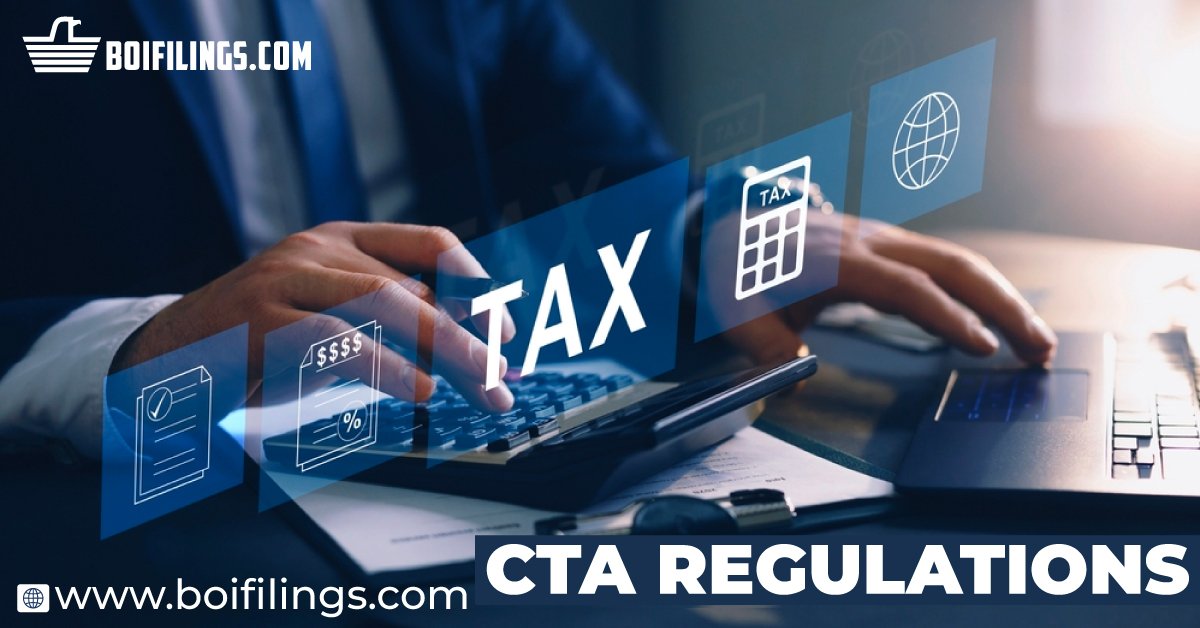As a business owner, you've likely heard about the Corporate Transparency Act CTA Regulations. However, you might be wondering what it really means for your business. CTA Corporate Transparency Act. After all, amidst the day-to-day grind of running a company, understanding the legalese of new laws can sometimes be left on the back burner. Let's break it down and see what's most important for you to know about the CTA code of ethics.
CTA Regulations

Why Was the Corporate Transparency Act Established?
Before diving into the nitty-gritty, it's essential to grasp the "why" behind this legislation. Anti-Money Laundering The CTA compliance requirements was designed to crack down on illicit activities that might be hidden behind shell corporations. Historically, some individuals have taken advantage of the anonymity that corporations, limited liability companies, and similar entities offer.
They've engaged in money laundering, financing of terrorism, and tax evasion, among other illegal activities. FATF - Financial Action Task ForceThe CTA compliance requirements is the government's answer to these issues – a bid to enhance transparency and ensure that companies in the U.S. operate with clear and open intentions.
Your Business Must Follow the New CTA Law
The recent Corporate Transparency Act marked a significant policy transformation. want to know What is the NSBA. Now, most LLCs and corporations are mandated to provide information about their beneficial ownership to FinCEN, the acronym for Financial Crimes Enforcement Network. This new rule will be implemented starting January 1, 2024.
Such businesses need to submit their initial Beneficial Ownership Information reports within a month from the date they are established or authorized to operate. Corporate Transparency Act 2023 Companies already in existence are also obligated to refresh their BOI reports within a month if there are modifications to previously submitted data.
Our team is ready to assist in ensuring your BOI submission is accurate and timely, safeguarding your business from stringent penalties, which could include fines of up to $500 each day. Financial Crimes Enforcement Network To get started with your BOI submission, please visit our website's main page. Alternatively, you're welcome to ring us up. We're here to guide you through this legislation and ensure your enterprise remains compliant.
Who Does the CTA Affect?
Are you thinking, "Will this affect my business?" The short answer is: that it might. Financial Action Task Force If
you own a corporation, a limited liability company, or a similar entity, you'll want to familiarize yourself with the CTA legal requirements provisions. It's essential to note that the CTA registration process primarily targets smaller businesses that don't already report ownership details to another federal agency. Know What is AML. If you're a larger corporation with securities registered under the Securities Exchange Act, for instance, you'll likely be exempt, as you're already held to strict transparency standards. Know about CTA registration process
What Information Must Be Reported?
So, what's at the heart of this transparency push? Anti-money laundering compliance. The CTA disclosure requirements requires qualifying businesses to report specific details about their beneficial owners. Here's what that means:
- Beneficial Owner: In simple terms, a beneficial owner is someone who enjoys the benefits of owning a business, even if the title isn't in their name. Beneficial Owner for an LLC. They might control the entity, have a substantial stake in its operations, or stand to gain from its financial growth.
- Required Details: If your business falls under the CTA legal requirements purview, you'll be expected to provide the name, birthdate, current address, and identification number (like a driver's license or passport number) of all beneficial owners.
What's important to note here is that the CTA industry standards isn't attempting to add undue burdens on businesses. Know about BOI Filling. It aims to ensure that everyone plays on a level field and that there's no room for nefarious activities behind the veil of corporate structures.
How Does Reporting Work?
The process might seem daunting, but it's been designed to be as streamlined as possible. CTA disclosure requirementsThe Financial Crimes Enforcement Network (FinCEN) is the agency responsible for collecting and storing this beneficial ownership information. Don't worry – this isn't about putting your business details on blast. Beneficial Ownership Information reporting requirements The information is confidential and is only accessed under specific circumstances, such as during law enforcement investigations.
You'll be required to submit this information at the time of registration of your business entity. But what if your business was formed before the CTA advisory rules came into effect? Beneficial Ownership Report. In that case, there's a transitional period for you to get your details to FinCEN.
And remember, just like your business evolves, your ownership structure might too. So, if there are changes in beneficial ownership, you're expected to update this information within a set time frame.
What Are the Implications of Non-Compliance?
Nobody likes penalties, right? The CTA reporting obligations imposes penalties for failing to adhere to its Regulatory guidelines for CTAs. Neglecting to disclose necessary beneficial ownership information or intentionally submitting inaccurate data can lead to significant fines and potential incarceration. Do you want to know NSBA, The National Small Business Association? This might sound intense, but remember, the goal of the CTA registration process is to ensure transparency and deter illicit activities.
How Can You Stay Compliant?
The first step is awareness, so kudos to you for reading up on this! For a smooth experience:
- Consult Our Professionals: It’s always a good idea to touch base with our organization’s legal or financial experts familiar with the CTAs and NFA regulations to ensure you're on the right track.
- Maintain Up-to-date Records: Ensure you have the latest information about all beneficial owners and update FinCEN as required.
- Stay Informed: As with most laws, there might be updates, changes, or new interpretations of the CTA disclosure requirements. Regularly check in on any developments to ensure you remain compliant.
The Broader Perspective: Transparency in Business
While the CTA reporting obligations focuses specifically on the disclosure of beneficial ownership, it's part of a broader global trend emphasizing transparency in the world of business. Customer Due Diligence for Business Owners. So, even as you work to comply with this specific act, it's worth considering the broader implications of transparency in your operations. visit here CTA Regulations.
The Power of Transparency for Business Growth
Transparency isn't just about compliance; it's an active tool for business growth. Here's why:
- Trust Building: Today's consumers, partners, and stakeholders are more informed than ever. Commodity Trading Advisor Regulations They value and trust businesses that are transparent about their operations, ownership, and decision-making processes.
- Attracting Investments: Transparent businesses often find it easier to attract investors. When investors have clear insights into a company's workings and ownership, they're more likely to invest with confidence.
- Operational Efficiency: Embracing transparency often means having clear processes in place. This can lead to fewer errors, better decision-making, and increased operational efficiency. Learn more CTAs and NFA regulations.
The Challenge of Balancing Privacy with Transparency
While transparency is vital, so is privacy. Business owners often grapple with the challenge of deciding how much information to share and what to hold back. It's crucial to strike a balance. PIL Personally Identifiable Information. The CTA industry standards is one such tool that aims to ensure transparency in areas of critical importance, like beneficial ownership while respecting the privacy of businesses.
Embracing a Culture of Transparency
As you adapt to the CTA regulations, consider taking a step further:
- Encourage Communication: Cultivate a workplace atmosphere in which employees are encouraged to freely express their ideas and provide feedback. Beneficial Ownership Information. Fostering open communication can pave the way for innovation and organizational expansion. visit here CTA advisory rules.
- Share Successes and Failures: By being open about both triumphs and setbacks, you not only build trust but also create learning opportunities.
- Engage with Stakeholders: Regularly update your stakeholders, be it customers, investors, or the general public, about significant business developments. Beneficial Ownership Secure System This fosters a sense of inclusion and trust.
In Summary
it's imperative to understand the significance of legislation surrounding the Commodity Trading Advisor Regulations. The Corporate Transparency Act isn't just a bureaucratic hurdle; it's an effort to promote ethical business practices and deter financial crimes. Its implementation is a testament to a growing global emphasis on business transparency.
For many businesses, navigating this fresh landscape of Regulatory guidelines for CTAs can seem daunting. What is Ultimate Beneficial Ownership? That's where we step in. CTA reporting obligations Our team is not just about compliance; it's about ensuring you understand the 'why' behind these rules and the broader implications for your business. Know about CTAs and NFA regulations
Adherence to the CTA code of ethics not only keeps you on the right side of the law but can also bolster your company's reputation. In today's business environment, transparency is often seen as a mark of trustworthiness and credibility. Know about Beneficial Owner. By aligning with these Regulatory guidelines for CTAs promptly and efficiently, you signal to partners, stakeholders, and customers that your business values ethical operations and integrity. Learn more CTA compliance requirements.
While the penalties for non-compliance, such as the potential $500 per-day fine, are certainly motivation enough to ensure timely and accurate reporting, the benefits of compliance extend far beyond avoiding penalties. CTA legal requirements. They can position your business as a leader in corporate responsibility and transparency. What are Beneficial Owners?
To streamline the process, our platform offers user-friendly tools and resources to help businesses navigate the BOI filing. What is the FATF report? Whether you're looking for a step-by-step guide or personalized assistance, we have solutions tailored to meet your needs. visit here Commodity Trading Advisor Regulations.
In a world where business regulations are continually evolving, staying updated and compliant is paramount. And you don't have to go it alone. What is an Entity Beneficial Owner for an LLC? Our team is committed to ensuring that businesses, big or small, have the support and resources they need to thrive in this new era of transparency. CTA industry standards If you have further questions or need more insights about the Corporate Transparency Act and its implications for your business, don't hesitate to reach out. CTA code of ethics We're more than ready to assist. Visit the website & get more information on BOIfilling.com.
File a Required BOI
In the evolving landscape of business regulations, staying compliant is more than a mere legal formality; it's now a cornerstone of ethical and responsible entrepreneurship to file a required BOI.
Read More
CTA Rules
Let's go over CTA code of ethics rules that go into effect on January 1, 2024 (Corporate Transparency Act) for US businesses via BOI filing (Beneficial Ownership Information) with FinCEN: Learn here CTAs and NFA regulations.
Read MoreEXPLORE RELATED TOPICS
BENEFICIAL OWNER 2024 WHAT IS THE BENEFICIAL OWNERSHIP REPORT BOI LLC Ruling WHAT IS A BOI BOI REPORT